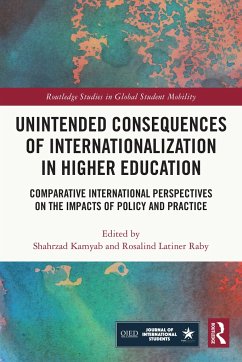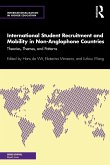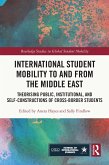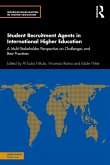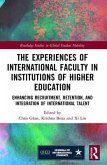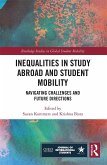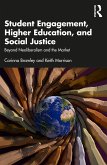By presenting case studies of internationalization in institutions of higher education around the world, this volume identifies unforeseen or unintended impacts within and across countries.
With contributions from Africa, Asia, Europe, Latin America, Middle East, and North America the volume considers the nature and origin of positive and negative unintended consequences of internationalization policy and practice in national contexts, while also offering uniquely comparative insights. Chapters consider how internationalization is reflected in curricula, teaching, research, and mobility initiatives to highlight common pitfalls, as well as best practice for effective, sustainable, and equitable internationalization globally. Using a critical lens, the book explores how internationalization offers opportunities for learning, for entrepreneurial change, and for knowledge dissemination, and generates paradoxes and dilemmas in terms of political and ethical issues for individuals, communities, and the institutions themselves.
Foregrounding the study of internalization in countries not typically studied, this book is a valuable resource for researchers and academics with an interest in internationalization, comparative and international education, and the sociology of education.
With contributions from Africa, Asia, Europe, Latin America, Middle East, and North America the volume considers the nature and origin of positive and negative unintended consequences of internationalization policy and practice in national contexts, while also offering uniquely comparative insights. Chapters consider how internationalization is reflected in curricula, teaching, research, and mobility initiatives to highlight common pitfalls, as well as best practice for effective, sustainable, and equitable internationalization globally. Using a critical lens, the book explores how internationalization offers opportunities for learning, for entrepreneurial change, and for knowledge dissemination, and generates paradoxes and dilemmas in terms of political and ethical issues for individuals, communities, and the institutions themselves.
Foregrounding the study of internalization in countries not typically studied, this book is a valuable resource for researchers and academics with an interest in internationalization, comparative and international education, and the sociology of education.
"It is hard to imagine a more needed or timely contribution than the one presented by the book, Unintended Consequences of Internationalization in Higher Education. Kamyab and Raby go beyond critical analysis of important cases, and lay out a framework for exploring internationalization beyond intent. This book will surely become required reading in the field."
Gerardo L. Blanco, Ph.D, Academic Director, Center for International Higher Education, Boston College, USA.
"This book, Unintended Consequences of Internationalization in Higher Education: Comparative International Perspectives on the Impacts of Policy and Practice is a diagnosis of the current situation of the process of internationalization worldwide. It is also drawing guidelines for countries seeking the internationalization. Reading this book means learning from best practices and getting knowledgeable to prepare plans for higher education reform and development."
Noureddine Kaabi, Former Secretary of State of Tunisia for Development and International Cooperation
"We are going through a period of profound reflection on the roles and rationales of internationalisation of higher education. This book is both timely and necessary to explore unintended consequences and how they are affecting national and institutional policies and practices. The framework presented here offers us a new way to think about internationalisation in order to make it more meaningful both within our institutions and beyond, to the communities we serve."
Fiona Hunter, Ph.D., Associate Director, Centre for Higher Education Internationalisation (CHEI) Università Cattolica del Sacro Cuore, Milan, Italy
"This book by a truly global team of authors and scholars asks the bold yet timely question: Is internationalization always a good thing? Most importantly, what are its implications for the Global South and how can we best harness the intended and unintended impacts of internationalization? A much-needed and candid addition that can inform practice and scholarship in our field."
Rajika Bhandari, Ph.D., scholar-practitioner in international higher education, author, and founder of Rajika Bhandari Advisors.
"As an age-old practice in learning, internationalization policy carries forth unintended outcomes. In the 21st century, the policy has been dominated by the Global North, and in this book, authors craft a novel framework to analyze and evaluate the unintended outcomes of such dominance on the Global South, offering a long-awaited perspective to enrich the field of comparative international higher education!"
Yovana Parmeswaree Soobrayen Veerasamy, Ph.D., Assistant Professor, Stony Brook University, New York, USA. Executive Researcher for the World Council on Intercultural & Global Competence, Founder of MENA group & the Africa group
"As the world becomes more complex, so does the work of internationalizing higher education. The unintended consequences that inevitably follow are seldom part of the scholarly discourse. Fortunately, in this pioneering study, Kamyab and Raby provide us with language and tools to embrace this phenomenon. Unintended Consequences of Internationalization in Higher Education offers a useful framework for identifying and analyzing instances where intent and outcome diverge. The impressive lineup of authors the editors have assembled to explore unintended consequences around the world is further testament to the global relevance of this new area of study."
Kyle A. Long, Ph.D., Senior Director, Office of Organizational Strategy and Change Northwestern University, USA
"Today, globalization is a strategic mainstream factor that affects all sectors of all countries. This book talks about the internationalization in Higher Education focusing on unintended outcomes of internationalization by reporting a very relevant expertise in a comparative study of a range of countries. A very exciting and pleasant investigation!"
Khalid Berrada, Ph.D., Professor, Mohammed V University in Rabat, Expert-consultant in Higher Education, Unesco Chairholder "Teaching physics by doing", Morocco
"A wide-ranging invitation to think internationally about the layers, facets, and challenges of higher education internationalization. The book unfolds a variety of cases with new perspectives."
Adnan El-Amine, Ph.D., Professor of Education, Lebanese University
"We would like to think it is safe to assume that practitioners who work to advance higher education internationalization objectives are driven by clear goals that are mostly tied to measurable outcomes. We would also hope that scholars who study internationalization take pains to empirically document and accurately assess the wide range of possible factors. But what about the things the practitioners did not expect, or the outcomes the scholars did not anticipate, the 'unintended consequences'? This deliberate wording of 'consequences, both positive and negative, is of critical importance in this new book, for what plays out in one country undoubtedly is never the same in another. This book's wide geographic scope, particularly on as yet under-explored countries, makes a critical addition to the evolving study of internationalization today and adds depth to the puzzle of evolving internationalization."
Bernhard Streitwieser, Ph.D., Associate Professor of International Education & International Affairs, Director, International Education Program, Co-Chair, UNESCO Chair in International Education for Development, Director, Refugee Educational Advancement Laboratory (REAL), Graduate School of Education and Human Development, The George Washington University, Washington, DC
"Though the often-referenced iceberg analogy reminds us that much of what is important to a given context remains unseen, hidden below the surface, research on the internationalization of higher education has still largely focused on the direct, intended aspects of our efforts. This timely and insightful book introduces us to the importance of drawing clearer connections with the indirect, unintended outcomes of internationalization. By looking below the surface, we can better avoid missteps in evaluation, underestimation of outcomes and inaccurate projections of goals and outcomes."
Anthony C. Ogden, PhD., Founder & Managing Director, Gateway International Group, LLC
"This book highlights an important, but often overlooked, concept in the internationalization of higher education - its unintended consequences. In calling individuals working in the field to take a closer look at the purported intents of internationalization, this book calls for a reconsideration of the policies, products, and processes of internationalization as they relate to consequence - particularly those counter to intent. A strength of this book is that it conceptualizes unintended consequences not only as binary - positive or negative - but also as a composite, wherein positive and negative consequences occur simultaneously. Conceptually, the framework presented in this book is useful to practitioners in helping to think more deeply about the impacts of their programs, even if those impacts are not as intended."
Melissa Whatley, Ph.D. (she/her/hers), Assistant Professor of International and Global Education, SIT Graduate Institute
"The road to hell is paved with good intentions, says the old proverb. For scholars of internationalisation in higher education, this volume provides an excellent collection of cases to explain how misguided aspirations, uncritical thinking and educational malpractices cause unintended consequences which make international teachers and students equally unhappy in the long run. This book should serve as a moral and intellectual guide for all planners and practitioners of higher education internationalisation."
Anatoly Oleksiyenko, Ph.D. (Toronto), Associate Professor, Higher Education, Director, Comparative Education Research Centre (CERC), Editor-in-Chief, Universities & Intellectuals HKU Faculty of Education
Gerardo L. Blanco, Ph.D, Academic Director, Center for International Higher Education, Boston College, USA.
"This book, Unintended Consequences of Internationalization in Higher Education: Comparative International Perspectives on the Impacts of Policy and Practice is a diagnosis of the current situation of the process of internationalization worldwide. It is also drawing guidelines for countries seeking the internationalization. Reading this book means learning from best practices and getting knowledgeable to prepare plans for higher education reform and development."
Noureddine Kaabi, Former Secretary of State of Tunisia for Development and International Cooperation
"We are going through a period of profound reflection on the roles and rationales of internationalisation of higher education. This book is both timely and necessary to explore unintended consequences and how they are affecting national and institutional policies and practices. The framework presented here offers us a new way to think about internationalisation in order to make it more meaningful both within our institutions and beyond, to the communities we serve."
Fiona Hunter, Ph.D., Associate Director, Centre for Higher Education Internationalisation (CHEI) Università Cattolica del Sacro Cuore, Milan, Italy
"This book by a truly global team of authors and scholars asks the bold yet timely question: Is internationalization always a good thing? Most importantly, what are its implications for the Global South and how can we best harness the intended and unintended impacts of internationalization? A much-needed and candid addition that can inform practice and scholarship in our field."
Rajika Bhandari, Ph.D., scholar-practitioner in international higher education, author, and founder of Rajika Bhandari Advisors.
"As an age-old practice in learning, internationalization policy carries forth unintended outcomes. In the 21st century, the policy has been dominated by the Global North, and in this book, authors craft a novel framework to analyze and evaluate the unintended outcomes of such dominance on the Global South, offering a long-awaited perspective to enrich the field of comparative international higher education!"
Yovana Parmeswaree Soobrayen Veerasamy, Ph.D., Assistant Professor, Stony Brook University, New York, USA. Executive Researcher for the World Council on Intercultural & Global Competence, Founder of MENA group & the Africa group
"As the world becomes more complex, so does the work of internationalizing higher education. The unintended consequences that inevitably follow are seldom part of the scholarly discourse. Fortunately, in this pioneering study, Kamyab and Raby provide us with language and tools to embrace this phenomenon. Unintended Consequences of Internationalization in Higher Education offers a useful framework for identifying and analyzing instances where intent and outcome diverge. The impressive lineup of authors the editors have assembled to explore unintended consequences around the world is further testament to the global relevance of this new area of study."
Kyle A. Long, Ph.D., Senior Director, Office of Organizational Strategy and Change Northwestern University, USA
"Today, globalization is a strategic mainstream factor that affects all sectors of all countries. This book talks about the internationalization in Higher Education focusing on unintended outcomes of internationalization by reporting a very relevant expertise in a comparative study of a range of countries. A very exciting and pleasant investigation!"
Khalid Berrada, Ph.D., Professor, Mohammed V University in Rabat, Expert-consultant in Higher Education, Unesco Chairholder "Teaching physics by doing", Morocco
"A wide-ranging invitation to think internationally about the layers, facets, and challenges of higher education internationalization. The book unfolds a variety of cases with new perspectives."
Adnan El-Amine, Ph.D., Professor of Education, Lebanese University
"We would like to think it is safe to assume that practitioners who work to advance higher education internationalization objectives are driven by clear goals that are mostly tied to measurable outcomes. We would also hope that scholars who study internationalization take pains to empirically document and accurately assess the wide range of possible factors. But what about the things the practitioners did not expect, or the outcomes the scholars did not anticipate, the 'unintended consequences'? This deliberate wording of 'consequences, both positive and negative, is of critical importance in this new book, for what plays out in one country undoubtedly is never the same in another. This book's wide geographic scope, particularly on as yet under-explored countries, makes a critical addition to the evolving study of internationalization today and adds depth to the puzzle of evolving internationalization."
Bernhard Streitwieser, Ph.D., Associate Professor of International Education & International Affairs, Director, International Education Program, Co-Chair, UNESCO Chair in International Education for Development, Director, Refugee Educational Advancement Laboratory (REAL), Graduate School of Education and Human Development, The George Washington University, Washington, DC
"Though the often-referenced iceberg analogy reminds us that much of what is important to a given context remains unseen, hidden below the surface, research on the internationalization of higher education has still largely focused on the direct, intended aspects of our efforts. This timely and insightful book introduces us to the importance of drawing clearer connections with the indirect, unintended outcomes of internationalization. By looking below the surface, we can better avoid missteps in evaluation, underestimation of outcomes and inaccurate projections of goals and outcomes."
Anthony C. Ogden, PhD., Founder & Managing Director, Gateway International Group, LLC
"This book highlights an important, but often overlooked, concept in the internationalization of higher education - its unintended consequences. In calling individuals working in the field to take a closer look at the purported intents of internationalization, this book calls for a reconsideration of the policies, products, and processes of internationalization as they relate to consequence - particularly those counter to intent. A strength of this book is that it conceptualizes unintended consequences not only as binary - positive or negative - but also as a composite, wherein positive and negative consequences occur simultaneously. Conceptually, the framework presented in this book is useful to practitioners in helping to think more deeply about the impacts of their programs, even if those impacts are not as intended."
Melissa Whatley, Ph.D. (she/her/hers), Assistant Professor of International and Global Education, SIT Graduate Institute
"The road to hell is paved with good intentions, says the old proverb. For scholars of internationalisation in higher education, this volume provides an excellent collection of cases to explain how misguided aspirations, uncritical thinking and educational malpractices cause unintended consequences which make international teachers and students equally unhappy in the long run. This book should serve as a moral and intellectual guide for all planners and practitioners of higher education internationalisation."
Anatoly Oleksiyenko, Ph.D. (Toronto), Associate Professor, Higher Education, Director, Comparative Education Research Centre (CERC), Editor-in-Chief, Universities & Intellectuals HKU Faculty of Education

